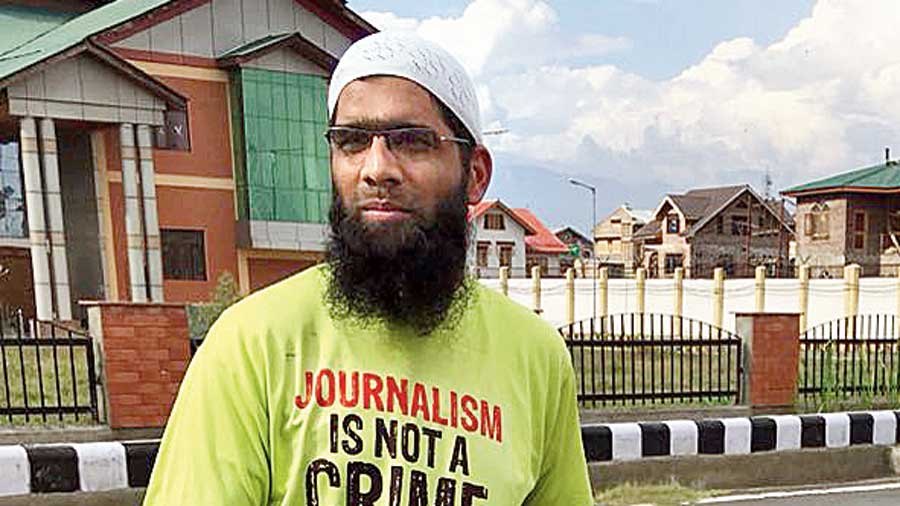Journalist Aasif Sultan lives hardly 4km from his only child, Areeba. But he has been unable to see her learn to walk, hear her first intelligible words, or watch her blossom into a 30-month-old sweetheart.
Aasif and Areeba, who lives in the family home in Srinagar’s Batamaloo locality, are separated by a handful of neighbourhoods and the impregnable walls of the Valley’s biggest central jail.
Aasif, a reporter with the news magazine Kashmir Narrator and the first Valley journalist booked under the anti-terror Unlawful Activities Prevention Act (UAPA), completed two years in jail in August.
The police claim he was arrested for links to militants but his family and various journalists’ associations vouch for his innocence and insist he was victimised for his journalism.
Aasif’s continued detention has shot back to limelight amid the debate over central BJP leaders’ selective outrage at the arrest of Republic TV managing director Arnab Goswami in a suicide-abetment case.
Goswami was granted interim bail by the Supreme Court on Wednesday after he spent eight days in custody. Aasif, who has not been convicted so far, has spent more than 800 days behind bars.
The Supreme Court cited the importance of personal liberty while hearing Goswami’s plea soon after it was filed although his bail petition was pending with a sessions court in Maharashtra. In Aasif’s case, the first hearing since the August 5, 2019, amendment of Article 370 was held last Monday — after a gap of more than 15 months, his father Sultan said.
“My husband paid for it (freedom). 806 days and counting. His family paid for it. His old parents paid for it. His small child paid for it,” Aasif’s wife Umm Areeba tweeted on Monday. “He must be freed now. To Allah we raise our hands for succour!”
Aasif’s father, Mohammad Sultan, said he was not surprised at BJP leaders’ differing reactions to the arrests of different journalists.
“He is a Kashmiri. They (the government) can do anything with us. We never had any freedom of speech here, from the very beginning,” Sultan, a retired government official, told The Telegraph.
Sultan’s other son, a doctor, lives abroad; it was Aasif who took care of the family.
Sultan said: “I’m a heart patient and have to undergo surgery in the next few days. If my son were around I would have had no worries. Thank God, my nephews will accompany me to hospital.
“It hurts me to see my grandchild grow up in her father’s absence. She was just a few months old when Aasif was arrested. A couple of times we took her along to see her father. Areeba is too young to understand all this but she cries ‘Baba’ when she sees the picture of her father.”
The picture shows Aasif in chain-fitted handcuffs, wearing a shirt carrying the slogan “Journalism is not a crime”.
Condemnation of Aasif's arrest has been stronger outside the country than within, perhaps because he has been accused of being a militant sympathiser.
In October last year, the American National Press Club chose Aasif for the Foreign Press Freedom Award. The New York-based Committee to Protect Journalists (CPJ), a non-profit, non-government organisation, ran a full-page ad in The Washington Post in August this year to express solidarity with Aasif.
Days earlier, the CPJ had written to Prime Minister Narendra Modi on the second anniversary of Aasif’s arrest, seeking his release. The letter was signed by 397 journalists and civil society members, including N. Ram, Karan Thapar and Harsh Mander.
On August 28, the police tweeted: “Aasif Sultan not booked for his journalism but in FIR no 173/2018 PS Batamaloo pertaining to hatching criminal conspiracy, harbouring & supporting terrorists who martyred a police constable on 12-08-2018 at #Batamaloo.”
Showkat Motta, Aasif’s editor at the magazine, said the police tweet had been a reaction to the Post ad.
He insisted that Aasif had been arrested for his professional work, saying his ordeal had begun after he wrote an article, “The Rise of Burhan”, for the magazine.
Hizbul Muzahideen commander Burhan Wani had been killed by the security forces in July 2016. The article was written two years after his death.
Motta said the police had accused Aasif of glorifying the militancy in his writings, and that this was proof he had been arrested for his journalism.
He said police officers had on record accused Aasif of “writing against the uniformed forces”.
Ahead of his arrest in 2018, Motta said, Aasif had received an email from “media cell/ CID J&K” that sought a clarification whether his articles were not “attempting to influence young impressionable minds” and “romanticise the terrorist”.
“But when the chargesheet was filed, such things found no mention and he was straightaway framed in a militancy case,” Motta said.
He said Aasif was being “framed”, and that not one of the “witnesses” the police had brought before the court had so far endorsed the prosecution’s allegations.
“The police claim a Hizbul Mujahideen letterhead was recovered from Aasif’s home. But when a police constable, a so-called witness, was asked by the lawyer in front of a judge whether the recovery was made in his presence, he said he was not present there,” Motta said.
“Even members of the family (at whose home) the militants had reportedly taken shelter (before carrying out the Batamaloo attack) have denied that Aasif had links with those militants.”











